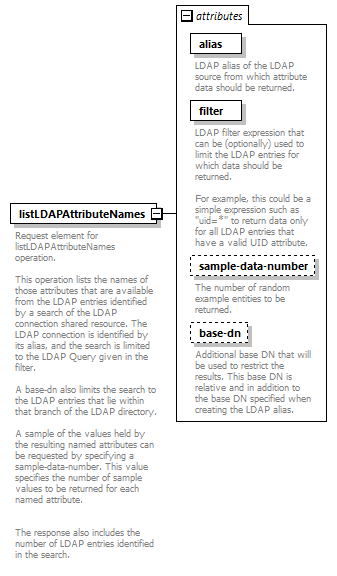| diagram |  |
||||||||||||||||||||||||||||||||||||||
| namespace | http://ldapservice.api.de.n2.tibco.com | ||||||||||||||||||||||||||||||||||||||
| properties |
|
||||||||||||||||||||||||||||||||||||||
| attributes |
|
||||||||||||||||||||||||||||||||||||||
| annotation |
|
||||||||||||||||||||||||||||||||||||||
| source | <xs:element name="listLDAPAttributeNames"> <xs:annotation> <xs:documentation>Request element for listLDAPAttributeNames operation. This operation lists the names of those attributes that are available from the LDAP entries identified by a search of the LDAP connection shared resource. The LDAP connection is identified by its alias, and the search is limited to the LDAP Query given in the filter. A base-dn also limits the search to the LDAP entries that lie within that branch of the LDAP directory. A sample of the values held by the resulting named attributes can be requested by specifying a sample-data-number. This value specifies the number of sample values to be returned for each named attribute. The response also includes the number of LDAP entries identified in the search. </xs:documentation> </xs:annotation> <xs:complexType> <xs:attribute name="alias" type="xs:string" use="required"> <xs:annotation> <xs:documentation>LDAP alias of the LDAP source from which attribute data should be returned.</xs:documentation> </xs:annotation> </xs:attribute> <xs:attribute name="filter" type="xs:string" use="required"> <xs:annotation> <xs:documentation>LDAP filter expression that can be (optionally) used to limit the LDAP entries for which data should be returned. For example, this could be a simple expression such as "uid=*" to return data only for all LDAP entries that have a valid UID attribute.</xs:documentation> </xs:annotation> </xs:attribute> <xs:attribute name="sample-data-number" type="xs:int" default="0"> <xs:annotation> <xs:documentation>The number of random example entities to be returned.</xs:documentation> </xs:annotation> </xs:attribute> <xs:attribute name="base-dn" type="xs:string" use="optional"> <xs:annotation> <xs:documentation>Additional base DN that will be used to restrict the results. This base DN is relative and in addition to the base DN specified when creating the LDAP alias.</xs:documentation> </xs:annotation> </xs:attribute> </xs:complexType> </xs:element> |
attribute listLDAPAttributeNames/@alias
| type | xs:string | ||
| properties |
|
||
| annotation |
|
||
| source | <xs:attribute name="alias" type="xs:string" use="required"> <xs:annotation> <xs:documentation>LDAP alias of the LDAP source from which attribute data should be returned.</xs:documentation> </xs:annotation> </xs:attribute> |
attribute listLDAPAttributeNames/@filter
| type | xs:string | ||
| properties |
|
||
| annotation |
|
||
| source | <xs:attribute name="filter" type="xs:string" use="required"> <xs:annotation> <xs:documentation>LDAP filter expression that can be (optionally) used to limit the LDAP entries for which data should be returned. For example, this could be a simple expression such as "uid=*" to return data only for all LDAP entries that have a valid UID attribute.</xs:documentation> </xs:annotation> </xs:attribute> |
attribute listLDAPAttributeNames/@sample-data-number
| type | xs:int | ||
| properties |
|
||
| annotation |
|
||
| source | <xs:attribute name="sample-data-number" type="xs:int" default="0"> <xs:annotation> <xs:documentation>The number of random example entities to be returned.</xs:documentation> </xs:annotation> </xs:attribute> |
attribute listLDAPAttributeNames/@base-dn
| type | xs:string | ||
| properties |
|
||
| annotation |
|
||
| source | <xs:attribute name="base-dn" type="xs:string" use="optional"> <xs:annotation> <xs:documentation>Additional base DN that will be used to restrict the results. This base DN is relative and in addition to the base DN specified when creating the LDAP alias.</xs:documentation> </xs:annotation> </xs:attribute> |
WSDL documentation generated by XMLSpy WSDL Editor http://www.altova.com/xmlspy